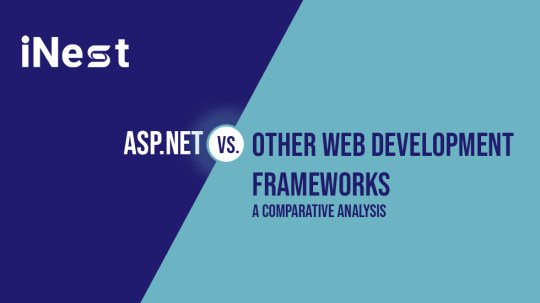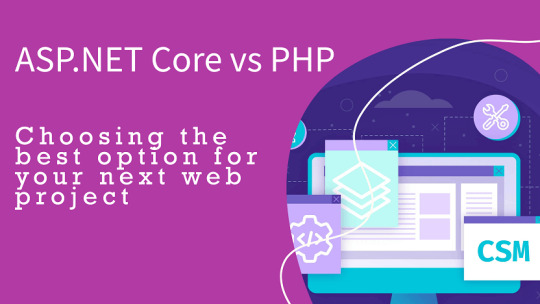#PHP and ASP.NET.
Explore tagged Tumblr posts
Text
ASP.NET vs. Other Web Development Frameworks: Features, Benefits, and Use Cases
In the dynamic world of web development, selecting the right framework is crucial for creating robust and scalable web applications. Among the plethora of options, ASP.NET, a Microsoft-powered framework, stands out for its versatility and enterprise-grade capabilities. This article explores how ASP.NET compares with other popular frameworks like PHP, Ruby on Rails, and Django, focusing on their features, benefits, and use cases.
What is ASP.NET?
ASP.NET is a powerful server-side web development framework integrated into the .NET ecosystem. It supports multiple programming languages like C# and Visual Basic, offering developers a flexible and efficient environment. The framework’s adoption of the Model-View-Controller (MVC) architecture simplifies code organization, making development and maintenance more efficient.

Key highlights of ASP.NET include:
Cross-platform compatibility with .NET Core.
Seamless integration with Microsoft technologies.
A rich Integrated Development Environment (IDE) in Visual Studio.
Comparative Analysis: ASP.NET vs Other Frameworks
ASP.NET vs PHP
Performance: ASP.NET applications are compiled, ensuring faster execution compared to PHP’s interpreted scripts.
Security: The framework’s integration with the Windows operating system offers advanced security features, making it ideal for enterprise-grade applications.
Use Case: Choose ASP.NET for large-scale, performance-critical projects, while PHP is suited for lightweight and budget-conscious applications.
ASP.NET vs Ruby on Rails
Development Environment: ASP.NET’s Visual Studio IDE is a robust tool with features like code completion and debugging, offering a superior developer experience.
Scalability: Both frameworks support scalability, but ASP.NET’s deep integration with .NET technologies makes it ideal for enterprise applications.
Use Case: ASP.NET is preferred for projects needing comprehensive Microsoft ecosystem support, while Ruby on Rails is favored for startups emphasizing speed and simplicity.
ASP.NET vs Django
Modularity: Both frameworks excel in modularity and scalability. However, ASP.NET benefits from its extensive library support and Microsoft ecosystem.
Integration: ASP.NET’s compatibility with Microsoft technologies makes it a compelling choice for enterprises already invested in the ecosystem.
Use Case: ASP.NET is well-suited for large-scale applications requiring seamless integration with Windows systems, while Django shines in data-driven applications powered by Python.
Key Features of ASP.NET
MVC Architecture
Enhances maintainability and debugging.
Separates application concerns for better organization.
Visual Studio IDE
Offers tools like code completion, debugging, and performance analysis.
Cross-platform Support
Enabled by .NET Core, ASP.NET runs on Windows, macOS, and Linux.
Advantages of ASP.NET
Language Interoperability
Supports multiple languages, fostering team collaboration.
Scalability and Performance
Handles high user volumes effortlessly.
Robust Security Features
Built-in authentication and authorization mechanisms.
Choosing the right web development framework depends on your project requirements, team expertise, and long-term goals. ASP.NET excels in scalability, performance, and integration, making it a top contender for enterprise-level web applications.
Whether you opt for PHP’s simplicity, Ruby on Rails’ developer-friendly conventions, or Django’s modularity, understanding their strengths ensures an informed decision. As technology advances, ASP.NET continues to provide a comprehens
ive and reliable solution for building modern, scalable web applications.
Ready to build robust and scalable web applications? Contact iNstaweb today to harness the power of ASP.NET and elevate your web development projects!
#ASP.NET comparison#ASP.NET vs PHP#ASP.NET vs Ruby on Rails#ASP.NET vs Django#web development frameworks#ASP.NET features#scalable web applications
0 notes
Text

Choosing the right web development framework is a crucial step in ensuring the success of your project. Both ASP.NET Core and PHP have their strengths and weaknesses, making them popular choices for different types of web applications.
0 notes
Text
PHP Development in Vadodara: Mastering PHP 8 for Superior Web Solutions Explore cutting-edge PHP development in Vadodara, where PHP 8's JIT compiler revolutionizes web performance. Learn about microservices, DevOps, and more.
#web development#website development#website developer#web developer#web development company in Vadodara#PHP Development#ASP.NET Development#WordPress development#ecommerce development
0 notes
Text

Explore PHP and ASP.NET development services. Discover the strengths of each language and find out which is best for your web development project!
0 notes
Text

#Advance Your Career as an ASP.NET Developer with EIIT's Comprehensive Training!#.#Enroll in our comprehensive course today and embark on a journey to a successful career in web development!#🌟 High-Quality Training#Our training methodology adheres to the highest IT standards#ensuring you are well-prepared for the job market.#🌟 Internship Opportunities#Acquire practical experience through an internship at EFox Technology Private Limited.#🌟 Placement Support#Receive comprehensive job assistance from E-fox Consultancy Services to facilitate your entry into the industry.#📅 Enroll Now and Take Advantage of the Early Bird Discount!#Call: 8445023234#Visit: www.efoxinstitute.com.#developer#softwaredeveloper#androiddeveloper#appdeveloper#mobileappdevelopment#softwarecompany#programming#java#php#project#programmer#developers#efoxinstitute#bareilly#BTech#MCA#Mtech See less
0 notes
Text
Web development framework
Web development framework A web development framework serves as an organized assortment of pre-written code and tools, utilized by developers to streamline the creation of websites and web applications. It furnishes a foundation and structure for constructing web-based applications, presenting a collection of predefined functions, libraries, and best practices. These frameworks are devised to…
View On WordPress
#Angular#ASP.NET#C#Django#Java#JavaScript#Laravel#MongoDB#MySQL#PHP#Python#Rails#ReactJS#Ruby#Spring Boot#TypeScript#Vue.js#Web development framework
0 notes
Text

PHP Development services in Alpharetta
GMA Technology's PHP development services create multilingual websites that cater to diverse audiences worldwide. Expand your horizons with a website that speaks to your customers in their language.
For More: https://www.gmatechnology.com/ Call Now : 1770-235-4853
#PHP Development services in Alpharetta#web development#web design#best web development company in united states#website landing page design#digital marketing company in usa#asp.net web and application development#magento development#logo design company#web designing company#web development company
0 notes
Text
Kedves tumbli népe!
Párom fejlesztői munkát keres Budapesten vagy remote. 2020 óta dolgozik a szakmájában és nagyon ügyes:) Amilyen nyelveket ismer: C#, PHP, Nuxt, Angular, ASP.NET Core, stb. Elmondásra a backend az erőssége, de eddig fullstack dolgozott. Kérésre küldök CV-t :) és ne haragudjatok a szakmaiatlan leírásért, egyáltalán nem értek ehhez ╰(✿´⌣`✿)╯♡

31 notes
·
View notes
Text
DAHA - DEVASA+ (2)

" Daha.net: Çeşitlilikteki Hosting Seçenekleriyle İnternet Varlığınızı Şekillendirin!"
Daha.net, her türden web ihtiyacınıza uygun hosting çözümleri sunan bir lider hosting platformudur. Linux hosting, Windows hosting, reseller hosting ve bayi hosting gibi çeşitlilikteki hizmetleriyle, kullanıcılarına esneklik ve performans sunarak, internet varlıklarını şekillendirmelerine yardımcı olur.
Linux Hosting - Güvenilir, Güçlü ve Açık Kaynak:
Daha.net Linux hosting çözümleri, güvenilir, güçlü ve açık kaynak teknolojileri üzerine kurulmuştur. PHP, MySQL ve diğer açık kaynak teknolojileri ile uyumlu olarak çalışan bu hosting seçeneği, gelişmiş kullanıcılar için idealdir.
Windows Hosting - Microsoft Teknolojileri ile Güçlendirilmiş Hizmet:
Windows hosting, Daha.net Microsoft teknolojileri ile güçlendirilmiş bir hosting çözümüdür. ASP.NET, MSSQL ve Windows sunucuları ile entegre çalışarak, Windows tabanlı projelerinize özel olarak tasarlanmıştır.
Reseller Hosting - İşinizi Büyütün, Kazançlarınızı Artırın:
Reseller hosting seçenekleri, kendi hosting işinizi kurmanızı ve yönetmenizi sağlar. Reseller hosting paketleri ile kendi müşterilerinize hosting hizmetleri sunabilir, kârınızı artırabilirsiniz.
Bayi Hosting - Güçlü Altyapı, Güvenilir Hizmet:
Bayi hosting, büyük projeler ve müşteri portföyleri için ideal bir çözümdür. Güçlü altyapısı ve güvenilir hizmeti ile bayi hosting, büyük projeleri sorunsuz bir şekilde yönetmenizi sağlar.
Daha.net, Linux hosting, Windows hosting, reseller hosting ve bayi hosting gibi çeşitlilikteki hosting seçenekleri ile kullanıcılarına geniş bir yelpazede çözümler sunar. Her türden projeye uygun hosting hizmeti ile internet varlığınızı en üst düzeye çıkarmak için web sitemizi ziyaret edin.
1K notes
·
View notes
Text
Prevent HTTP Parameter Pollution in Laravel with Secure Coding
Understanding HTTP Parameter Pollution in Laravel
HTTP Parameter Pollution (HPP) is a web security vulnerability that occurs when an attacker manipulates multiple HTTP parameters with the same name to bypass security controls, exploit application logic, or perform malicious actions. Laravel, like many PHP frameworks, processes input parameters in a way that can be exploited if not handled correctly.

In this blog, we’ll explore how HPP works, how it affects Laravel applications, and how to secure your web application with practical examples.
How HTTP Parameter Pollution Works
HPP occurs when an application receives multiple parameters with the same name in an HTTP request. Depending on how the backend processes them, unexpected behavior can occur.
Example of HTTP Request with HPP:
GET /search?category=electronics&category=books HTTP/1.1 Host: example.com
Different frameworks handle duplicate parameters differently:
PHP (Laravel): Takes the last occurrence (category=books) unless explicitly handled as an array.
Express.js (Node.js): Stores multiple values as an array.
ASP.NET: Might take the first occurrence (category=electronics).
If the application isn’t designed to handle duplicate parameters, attackers can manipulate input data, bypass security checks, or exploit business logic flaws.
Impact of HTTP Parameter Pollution on Laravel Apps
HPP vulnerabilities can lead to:
✅ Security Bypasses: Attackers can override security parameters, such as authentication tokens or access controls. ✅ Business Logic Manipulation: Altering shopping cart data, search filters, or API inputs. ✅ WAF Evasion: Some Web Application Firewalls (WAFs) may fail to detect malicious input when parameters are duplicated.
How Laravel Handles HTTP Parameters
Laravel processes query string parameters using the request() helper or Input facade. Consider this example:
use Illuminate\Http\Request; Route::get('/search', function (Request $request) { return $request->input('category'); });
If accessed via:
GET /search?category=electronics&category=books
Laravel would return only the last parameter, category=books, unless explicitly handled as an array.
Exploiting HPP in Laravel (Vulnerable Example)
Imagine a Laravel-based authentication system that verifies user roles via query parameters:
Route::get('/dashboard', function (Request $request) { if ($request->input('role') === 'admin') { return "Welcome, Admin!"; } else { return "Access Denied!"; } });
An attacker could manipulate the request like this:
GET /dashboard?role=user&role=admin
If Laravel processes only the last parameter, the attacker gains admin access.
Mitigating HTTP Parameter Pollution in Laravel
1. Validate Incoming Requests Properly
Laravel provides request validation that can enforce strict input handling:
use Illuminate\Http\Request; use Illuminate\Support\Facades\Validator; Route::get('/dashboard', function (Request $request) { $validator = Validator::make($request->all(), [ 'role' => 'required|string|in:user,admin' ]); if ($validator->fails()) { return "Invalid Role!"; } return $request->input('role') === 'admin' ? "Welcome, Admin!" : "Access Denied!"; });
2. Use Laravel’s Input Array Handling
Explicitly retrieve parameters as an array using:
$categories = request()->input('category', []);
Then process them safely:
Route::get('/search', function (Request $request) { $categories = $request->input('category', []); if (is_array($categories)) { return "Selected categories: " . implode(', ', $categories); } return "Invalid input!"; });
3. Encode Query Parameters Properly
Use Laravel’s built-in security functions such as:
e($request->input('category'));
or
htmlspecialchars($request->input('category'), ENT_QUOTES, 'UTF-8');
4. Use Middleware to Filter Requests
Create middleware to sanitize HTTP parameters:
namespace App\Http\Middleware; use Closure; use Illuminate\Http\Request; class SanitizeInputMiddleware { public function handle(Request $request, Closure $next) { $input = $request->all(); foreach ($input as $key => $value) { if (is_array($value)) { $input[$key] = array_unique($value); } } $request->replace($input); return $next($request); } }
Then, register it in Kernel.php:
protected $middleware = [ \App\Http\Middleware\SanitizeInputMiddleware::class, ];
Testing Your Laravel Application for HPP Vulnerabilities
To ensure your Laravel app is protected, scan your website using our free Website Security Scanner.

Screenshot of the free tools webpage where you can access security assessment tools.
You can also check the website vulnerability assessment report generated by our tool to check Website Vulnerability:

An Example of a vulnerability assessment report generated with our free tool, providing insights into possible vulnerabilities.
Conclusion
HTTP Parameter Pollution can be a critical vulnerability if left unchecked in Laravel applications. By implementing proper validation, input handling, middleware sanitation, and secure encoding, you can safeguard your web applications from potential exploits.
🔍 Protect your website now! Use our free tool for a quick website security test and ensure your site is safe from security threats.
For more cybersecurity updates, stay tuned to Pentest Testing Corp. Blog! 🚀
3 notes
·
View notes
Text
Top 20 Backend Development Tools In 2023
Backend development plays a crucial role in the operation and performance optimisation of web and mobile applications, serving as their foundational framework. In the context of the dynamic technological environment, it is imperative for developers to remain abreast of the most recent and effective backend development technologies. In the year 2023, a plethora of advanced tools have surfaced, leading to a significant transformation in the approach to backend development. Reach out to Nivida Web Solutions - a noted Web development company in Vadodara and let's craft a website that sets you apart.
This analysis aims to examine the leading 20 backend development tools projected for the year 2023, which possess the potential to optimise operational effectiveness, raise work output, and achieve exceptional outcomes.
1. Node.js:
Node.js continues to be a prominent contender in the realm of backend development, offering a resilient framework for constructing scalable, server-side applications through the utilisation of JavaScript. The asynchronous and event-driven nature of the system renders it highly suitable for real-time applications and microservices.
2. Express.js:
Express.js is a Node.js framework that offers a basic and flexible approach to backend development. It achieves this by providing streamlined routing, efficient handling of HTTP requests, and effective management of middleware. The software possesses a high degree of extensibility, allowing developers to create tailored solutions.
3. Django:
Django, a renowned Python framework, is widely recognised for its exceptional performance, robust security measures, and remarkable scalability. The framework adheres to the "batteries-included" principle, providing a wide range of pre-installed functionalities and libraries that enhance the speed and efficiency of the development process.
4. Flask:
Flask, an additional Python framework, is characterised by its lightweight nature and user-friendly interface. The framework offers fundamental capabilities for backend development and enables developers to incorporate additional functionalities as required, thus rendering it very adaptable.
5. Spring Boot:
Spring Boot, which is built on the Java programming language, streamlines the process of creating applications that are ready for deployment by employing a convention-over-configuration methodology. The platform provides a variety of functionalities to construct resilient and scalable backend systems. Embark on a digital journey with Nivida Web Solutions - the most distinguished Web development company in Gujarat. Let's create a stunning, functional website tailored to your business!
6. Ruby on Rails:
Ruby on Rails, also referred to as Rails, is renowned for its high level of efficiency and user-friendly nature. The framework employs the Ruby programming language and places a strong emphasis on convention over configuration, facilitating expedited development processes.
7. ASP.NET Core:
ASP.NET Core is a highly adaptable and efficient cross-platform framework that facilitates the development of backend solutions through the utilisation of the C# programming language. The product provides exceptional performance, robust security measures, and effortless compatibility with many systems.
8. Laravel:
Laravel, a framework developed using the PHP programming language, is well-acknowledged for its sophisticated syntax and user-centric functionalities. The utilisation of this technology streamlines intricate operations such as authentication, caching, and routing, hence facilitating an expedited development procedure.
9. NestJS:
NestJS is a Node.js framework that adheres to the architectural patterns established by Angular, hence exhibiting a progressive nature. The software possesses a high degree of modularity, hence facilitating the scalability and maintenance of applications. NestJS places a strong emphasis on the principles of maintainability and testability.
10. RubyMine:
RubyMine is an influential integrated development environment (IDE) designed specifically for the purpose of facilitating Ruby on Rails development. The software provides advanced code assistance, navigation, and debugging functionalities, hence augmenting the efficiency of Ruby developers. Looking for a standout web presence? Let Nivida Web Solutions - the most popular Web development company in India craft a website that impresses. Reach out now and let's get started!
11. PyCharm:
PyCharm, an integrated development environment (IDE) designed specifically for the Python programming language, is extensively utilised in the realm of backend development. The software offers intelligent code completion, comprehensive code analysis, and integrated tools to facilitate fast development and debugging processes.
12. IntelliJ IDEA:
IntelliJ IDEA, a widely utilised integrated development environment (IDE), provides comprehensive support for multiple programming languages, encompassing Java, Kotlin, and many more. The software is renowned for its advanced coding assistance and efficient capabilities, which greatly assist backend developers in producing code of superior quality.
13. Visual Studio Code (VSCode):
VSCode is a code editor that is known for its lightweight nature and open-source nature. Due to its extensive extension library and high level of customizability, this platform is widely favoured by backend developers due to its versatile nature.
14. Postman
Postman is an efficient and powerful application programming interface (API) testing tool that streamlines the process of doing backend testing and facilitating communication among developers. This tool facilitates the efficient design, testing, and documentation of APIs, hence assuring a smooth integration process. Every click counts in the digital world. Partner with Nivida Web Solutions - one of the top Web development companies in Vadodara to create a user-friendly, engaging website. Choose Nivida Web Solutions to boost your online impact!
15. Swagger:
Swagger, currently recognised as the OpenAPI Specification, serves to enable the process of designing, documenting, and evaluating APIs. The standardised structure of API description facilitates the seamless and uncomplicated integration process.
16. MongoDB:
MongoDB, a widely adopted NoSQL database, has notable advantages in terms of scalability, flexibility, and superior performance. Due to its capacity to effectively manage substantial quantities of data and accommodate various data models, it is extensively employed in the realm of backend development.
17. PostgreSQL:
PostgreSQL, an open-source relational database management system, is widely recognised for its robustness, adaptability, and comprehensive SQL capabilities. This option is highly recommended for projects that necessitate a resilient backend data repository.
18. Redis:
Redis is an essential component for caching and real-time analytics due to its ability to store data structures in memory. The indispensability of this technology lies in its high performance and its capability to effectively manage data structures, hence facilitating the optimisation of backend processes.
19. Kafka:
Apache Kafka is a distributed streaming platform that handles real-time data processing. It's commonly used for building scalable, fault-tolerant backend systems that require high-throughput data ingestion and processing. Dive into the digital era with a website that wows! Collaborate with Nivida Web Solutions - one of the leading Web development companies in Gujarat and boost your online presence.
20. Docker:
Docker is a containerization technology that facilitates the streamlined deployment and scalability of programs. The utilisation of containers enables backend developers to encapsulate their programmes and associated dependencies, hence ensuring uniformity and adaptability across diverse contexts.
Final Thoughts:
It is of utmost importance for developers to be updated on the most recent backend development technologies in order to effectively offer applications that are efficient, scalable, and safe. The compendium of the foremost 20 backend development tools projected for the year 2023 encompasses an extensive array of functions, adeptly accommodating the multifarious requirements of backend development endeavours. These technologies provide developers with the ability to enhance their backend development endeavours and provide users with outstanding experiences, whether through the creation of real-time applications, database management, or performance optimisation. Your website is your digital storefront. Make it appealing! Contact Nivida Web Solutions - one of the most renowned Web development companies in India and design a website that captivates your audience. Get started now!
7 notes
·
View notes
Text
7 Programming Languages for Web Development

Discover the top 7 programming languages that can elevate your projects:
1. JavaScript: Versatile and dynamic, perfect for creating interactive web content.
2. Python: Clear syntax and robust frameworks like Django make web development a breeze.
3. C#: Empowers developers with tools like ASP.NET Core for secure and powerful web applications.
4. PHP: Reliable and flexible, with a vast community and support for various frameworks.
5. C++: is ideal for demanding web applications because it is known for speed and efficiency.
6. Go: Simple, efficient, and built-in support for concurrency, making web development a joy.
7. Ruby: With Rails, it offers simplicity and speed, perfect for rapid development.
Find the perfect language for your web projects and unlock endless possibilities!
For more insights, visit us at https://srutatech.com/2024/03/18/top-7-programming-languages-web-development/
#seo#web development#digital marketing#app development#software development#digitalmarketing#digitalmarketingseo#digital marketing bensalem#digitalmarketingbensalem#digital marketing philadelphia
4 notes
·
View notes
Text

Python: Known for its simplicity and readability, Python is widely used in various domains such as web development, data science, machine learning, artificial intelligence, and more.
JavaScript: Primarily used for web development, JavaScript is essential for creating interactive websites and dynamic web applications. It's supported by all major web browsers.
Java: Java is a versatile language used in enterprise software development, Android app development, web applications, and more. It's known for its platform independence due to the Java Virtual Machine (JVM).
C/C++: These are powerful languages commonly used in system programming, game development, operating systems, and performance-critical applications.
C#: Developed by Microsoft, C# is widely used for building Windows applications, web applications using ASP.NET, and game development with Unity.
Ruby: Known for its simplicity and productivity, Ruby is often used for web development, especially with the Ruby on Rails framework.
Swift: Developed by Apple, Swift is used for iOS, macOS, watch OS, and tv OS app development. It's designed to be fast, safe, and expressive.
Kotlin: A modern language that runs on the Java Virtual Machine (JVM), Kotlin is officially supported for Android app development and is also used for server-side development.
PHP: Mainly used for server-side web development, PHP is commonly used with databases like MySQL to create dynamic websites and web applications.
Rust: Known for its memory safety features, Rust is used in systems programming, game development, and for building high-performance software where security and concurrency are important.
6 notes
·
View notes
